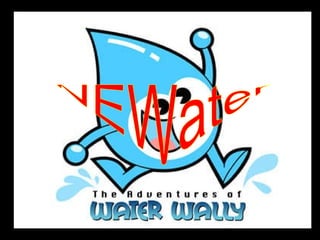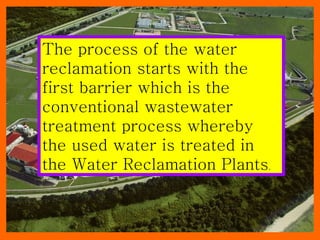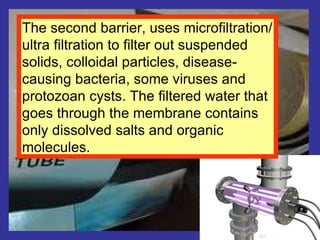Presentation1
- 1. NEWater
- 2. HISTORY !!
- 3. The Singapore Water Reclamation Study was initiated in 1998 by the Public Utilities Board (PUB) and the Ministry of the Environment and Water Resources (MEWR). The aim of this study was to determine if NEWater was a viable source of raw water for Singapore's needs. NEWater and desalination process were explored as means to reduce reliance on water imported from Malaysia, which has been a source of friction over the years.
- 4. PROCESS??
- 5. The process of the water reclamation starts with the first barrier which is the conventional wastewater treatment process whereby the used water is treated in the Water Reclamation Plants .
- 6. The second barrier, uses microfiltration/ultra filtration to filter out suspended solids, colloidal particles, disease-causing bacteria, some viruses and protozoan cysts. The filtered water that goes through the membrane contains only dissolved salts and organic molecules.
- 7. The third barrier, utilizes reverse osmosis, a semi-permeable membrane filters out undesirable contaminants such as bacteria, viruses, heavy metals, nitrate, chloride, sulphate, disinfection by-products, aromatic hydrocarbons, and pesticides that cannot pass through the membrane. Hence, NEWater is free from viruses and bacteria and contains very low levels of salts and organic matter causing the water at a potable quality .
- 8. The fourth barrier, acts as safety precaution. UV disinfection is used to ensure that all organisms are inactivated and the purity of the product water guaranteed. With the addition of some alkaline chemicals to restore the pH balance, the NEWater is ready for use.
- 9. END ;D THE








